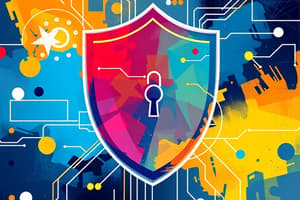Podcast
Questions and Answers
It is safe to share your password with anyone if you trust them.
It is safe to share your password with anyone if you trust them.
False (B)
Logging in to public networks is a safe practice.
Logging in to public networks is a safe practice.
False (B)
You should always read the terms and conditions before accepting them.
You should always read the terms and conditions before accepting them.
True (A)
It is advisable to post about your future vacation plans online.
It is advisable to post about your future vacation plans online.
Signup and view all the answers
You should avoid downloading software from untrusted websites.
You should avoid downloading software from untrusted websites.
Signup and view all the answers
Study Notes
Online Safety Practices
- Be cautious about what personal information you share online to protect your privacy.
- Always read and understand the terms and conditions before accepting them; don't just click accept automatically.
- Review the privacy policy of websites to be aware of how your data will be used and protected.
Social Networking Security
- Familiarize yourself with the security features of social networking sites to enhance your online safety.
- Keep your passwords confidential; share them with no one to prevent unauthorized access.
- Avoid logging into accounts using public Wi-Fi networks to reduce the risk of data interception.
Interactions and Social Connections
- Do not engage with strangers online or offline to avoid potential risks.
- Refrain from posting details about upcoming vacations; this can invite theft or break-ins.
- Only add individuals as friends on social platforms if you know them personally to maintain a secure network.
Internet Browsing Safety
- Steer clear of untrusted websites; they may expose you to malware or scams.
- Install reliable antivirus software on your computer and keep it updated to guard against online threats.
- Create a private Wi-Fi network at home by setting a password to enhance security.
Software and Email Caution
- Don't download files from untrusted sources as they may contain viruses or harmful software.
- Purchase authentic software instead of using pirated versions, which can be risky and illegal.
- Be wary of suspicious emails; do not reply or click on links from unknown sources to avoid phishing attacks.
Studying That Suits You
Use AI to generate personalized quizzes and flashcards to suit your learning preferences.
Description
Test your knowledge on essential online safety practices and social networking security. This quiz covers important tips for protecting personal information, understanding privacy policies, and safely interacting with others online. See how well you can navigate the risks of the digital world!




